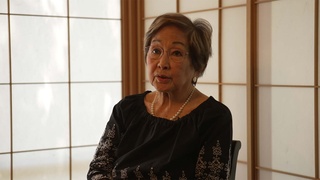Interviews
How he got into politics
I don't think anyone really at an early age says, "I'm gonna be..." well, other than, I guess, kids saying, "I want to be President of the United States." But I don't think anyone really says, "I want to be mayor of San Jose, California." But being -- and I started in community activities within the Japanese American community through our San Jose Japanese Methodist Church and JACL, and then that sort of expanded into activities in the total majority community. And so those kinds of community activities then led me to the possibility of being appointed to the city council.
The first time I... I didn't run for the city council. We had a mayor who was, we had our first directly elected mayor, and that created a vacancy on the city council. So the new mayor and two members of the city council came to me and said, "We've got to fill that vacancy on the city council. Would you consider putting your name in for it?" So I said, "Well, you know, I'm in business with my father and I really should talk to him about this."
So anyway, I talked to my dad and he said, "Well, we can make the arrangements between how you and I conduct the business," but he said, "In Japan there's an old adage about, if you were in politics, you're gonna be like the 'nail sticking out of the board.' And you know what happens to that nail? It always gets hammered. Now the question is, are you gonna be able to take that hammering?"
And so anyway, I thought about it and talked to a lot of friends, and I finally said, "Okay, I'll put my name in." And so I was appointed to the city council for the two-year unexpired term of the mayor who had vacated that post to become the new mayor.
Date: July 4, 2008
Location: Colorado, US
Interviewer: Tom Ikeda
Contributed by: Watase Media Arts Center, Japanese American National Museum
Explore More Videos

Unique perspective that a judge can bring to community organizations
Sansei judge for the Superior Court of Los Angeles County in California

Representing her Family and the Japanese American Community in Acting
(b. 1932) Nisei American stage, film, and TV actress

Popular Sports in the Nikkei Community (Japanese)
(b. 1962) Nisei Japanese Argentinian, currently residing in Japan

Food preparations for Keirokai
(b.1974) Japanese Colombian who currently resides in the United States

Japanese reputation in Colombia
(b.1974) Japanese Colombian who currently resides in the United States

Interracial marriage trends
(b.1974) Japanese Colombian who currently resides in the United States

Influence of Mexican culture after returning from camp
(b. 1943) Japanese American transgender attorney

Japanese American solidarity
(b. 1943) Japanese American transgender attorney

First Exposure to Animation
(b. 1934) Award-winning Disney animation artist who was incarcerated at Topaz during WWII

Political motivation to keep the camps open until end of 1944 election
(1924-2018) Researcher, Activist

Japanese community in Mission
(b. 1922) Canadian Nisei who was unable to return to Canada from Japan until 1952

Learning American cooking
(b.1909) Nisei from Washington. Incarcerated at Tule Lake and Minidoka during WWII. Resettled in Chicago after WWII

Parents in Utah
(b. 1939) a businesswoman whose family volunterily moved to Salt Lake City in Utah during the war.

Role of Hawaii internationally
(b.1926) Democratic politician and three-term Governor of Hawai'i

Not bringing shame to family
(1926 - 2012) Scholar and professor of anthropology. Leader in the establishment of ethnic studies as an academic discipline
